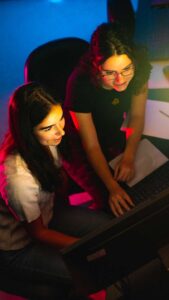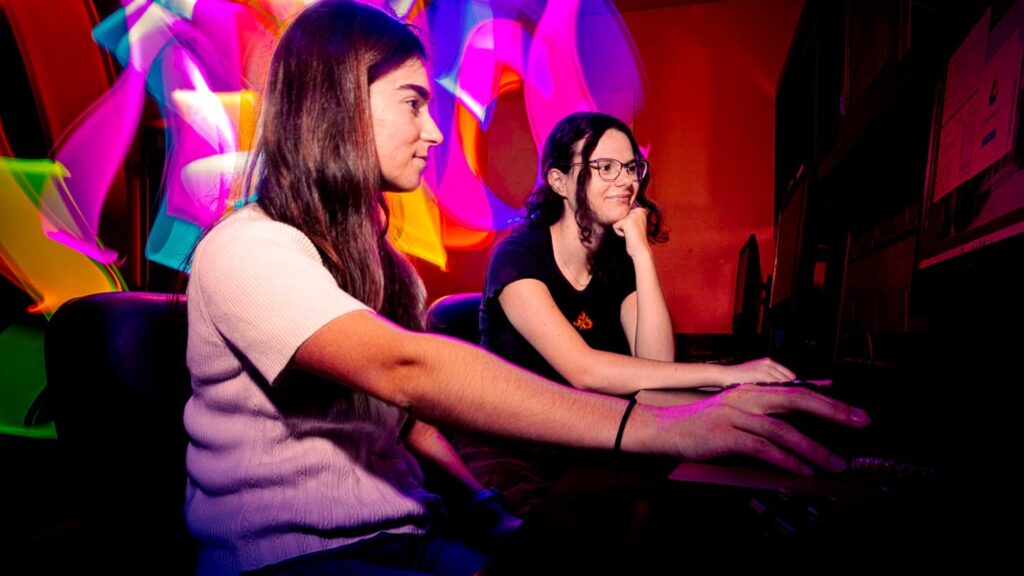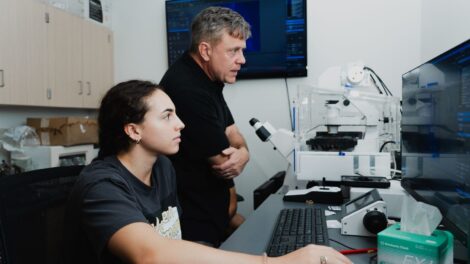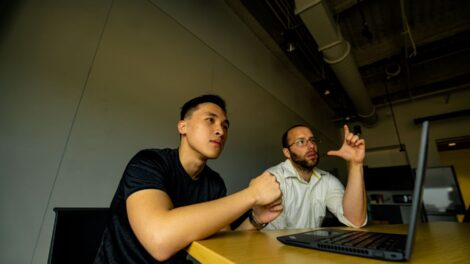Student-faculty research aims to help neurodivergent children thrive
By Stella Katsipoutis-Varkanis
According to the Centers for Disease Control and Prevention, 1 in 36 children in the United States is autistic. For these kids, navigating a world primarily designed for neurotypical people presents a unique set of challenges that’s widely misunderstood and severely under-studied. Along with assistant professor of psychology Jessie Greenlee, two Lafayette student-researchers devoted their summer to bridging that research gap.
As part of a larger collaboration with University of Wisconsin, Ricki Blaustein ’25 (a double major in psychology, and anthropology and sociology) and Rose Broderick ’24 (a psychology major) spent the last several months in Greenlee’s lab studying videos of autistic children interacting with their caregivers while completing goal-oriented tasks, which were recorded in a previous study, and identifying moments when the children exhibited emotional or behavioral dysregulation. The students’ goal was to match the children’s behavior in the video with the physiological arousal data that was collected while the children were completing the activities, in hopes of gaining a better understanding of autistic children’s development.
“Neurodiverse individuals are at extremely high risk for mental health challenges,” Greenlee says, “and so the ultimate goal of the research in my lab is to understand why that is, and what we can do to help autistic children thrive and lead happy, healthy lives—both now and as they develop into adults.”
“This is a large portion of our population whose needs may not be being met, because we haven’t invested the time and resources into understanding their experiences,” Broderick says. “By doing this research, we can potentially help reduce a lot of suffering for this population.”
The students’ process of reviewing the video recordings and matching them moment-by-moment to collected hard data—called micro-coding—is a highly meticulous and time-consuming one that requires painstaking attention to detail, accuracy, and precision.
“Rose and I have to make sure we’re both on the same page consistently, which means we have to practice a lot and understand different behavioral attitudes,” Blaustein says. “And we need to make sure we’re both coding the same exact information. If we don’t, we have to repeat the process, which could take several weeks.”

This summer, Rose Broderick ’24 (left) and Ricki Blaustein ’25 (right) studied videos of autistic children in hopes of gaining a better understanding of their development
Participating in this kind of study, Greenlee says, helps the students broaden not only their understanding of neurodiversity, but also their research skills.
“They’re working with diverse sets of data—video, psychological data, and surveys—which helps the students develop skills in a wide variety of areas that they can take with them after Lafayette,” she explains. “This is a massive head start, particularly for students who want to go on to continue doing research, but also for students who are interested in other fields like counseling, social work, or working in a health care facility.”
Blaustein and Broderick explain that working closely with Greenlee is yet another rewarding part of their research experience.
“I chose to come to Lafayette because of the low student-to-faculty ratio, and I really liked that I’d have the opportunity to form connections with my professors,” Blaustein says. “Prof. Greenlee has been a great mentor for me. Having had class with her and then working with her in a lab setting, she knows my strengths and weaknesses, and so she’s able to adapt what I’m learning.”
“Prof. Greenlee is a fantastic role model for me as a researcher, especially since this is a relatively new topic to me,” Broderick says. “She cares about the same things I care about in a research setting, making sure that we’re benefiting the right people through our work and not making assumptions.”
Greenlee says the students’ summer research experience has been equally as valuable to her work as a scholar: “Research takes a lot of time, effort, and hands, and working with the students helps move my research forward. The amount of initiative they’ve taken has been amazing. They’re creative, smart, and persistent, and they’re constantly thinking of things that I hadn’t that are extremely important to my research. I feel lucky to have them in my lab.”
Blaustein, who is a Bergh Family Fellow, and Broderick, who is an EXCEL Scholar, are both thankful for the generous funding of their respective programs, which gave them the opportunity to take part in the summer research project.

“I don’t think I would be able to do this kind of work if the research wasn’t funded for me,” Broderick says. “To get this type of opportunity at the undergraduate level is extremely valuable, because it helped me realize I want to work in this field for my career. To be able to make that decision before going into grad school and perhaps committing myself, my time, and my finances to going in another direction that might not be right for me probably saved me about five to 10 years. I also find the more questions I’ve been asking about this topic, the more I realize none of these questions have been answered, which leaves a lot of room for future research.”

